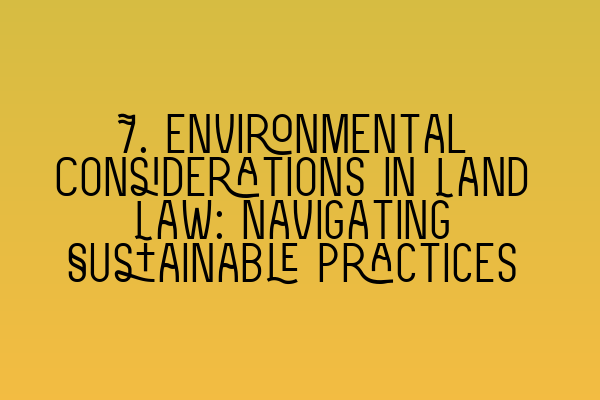Environmental Considerations in Land Law: Navigating Sustainable Practices
Introduction
In today’s world, environmental sustainability has become a key consideration in almost every field, and land law is no exception. As solicitors specializing in property law and land law at SQE Property Law & Land Law, we recognize the importance of navigating sustainable practices when it comes to environmental considerations in land law. In this blog post, we will explore the various aspects of environmental considerations in land law and discuss how individuals and organizations can ensure sustainable practices in their land dealings.
1. Environmental Impact Assessments
One of the most crucial aspects of sustainable land practices is conducting thorough environmental impact assessments. These assessments help identify potential harm to the environment and guide decision-making processes.
When engaging in land transactions, it is essential to consider the environmental impact of any planned changes or developments. This could include assessing the potential pollution, habitat destruction, or harm to biodiversity. Effective environmental impact assessments allow for sustainable decision-making and consideration of alternatives that minimize negative impacts on the environment.
2. Conservation and Preservation of Natural Resources
Preserving and conserving natural resources is a fundamental pillar of sustainable land practices. This involves understanding and protecting important ecosystems and habitats, such as wetlands, forests, and endangered species’ habitats.
Landowners and developers should consider the impact their activities may have on these resources and take steps to minimize or mitigate any negative effects. Working with qualified environmental consultants and experts can help identify necessary conservation measures and ensure compliance with local environmental regulations.
3. Sustainable Land Use and Planning
Sustainable land use and planning are crucial in minimizing environmental harm and promoting long-term sustainability. This includes considering factors such as zoning laws, urban design, and green space preservation.
When advising clients on land use and planning matters, solicitors should encourage sustainable development practices, such as integrating green spaces, promoting energy efficiency, and limiting urban sprawl. Additionally, promoting the use of sustainable building materials and renewable energy sources can further contribute to sustainable land use practices.
4. Legal Compliance and Environmental Regulations
Compliance with environmental regulations is essential in ensuring sustainable land practices. Solicitors play a key role in helping individuals and organizations understand and comply with relevant laws, regulations, and permits related to environmental considerations.
Being well-versed in environmental legislation and keeping up-to-date with any changes is crucial for solicitors who specialize in land law. This knowledge allows them to advise clients on their legal obligations and guide them through the necessary processes to adhere to environmental regulations.
5. Public Engagement and Stakeholder Involvement
Engaging the public and involving stakeholders in land transactions can contribute to more sustainable practices. Solicitors can play a role in facilitating dialogue between landowners, developers, community members, and environmental groups to foster a collaborative approach.
Public engagement can help identify and address concerns regarding environmental impacts, provide valuable input on sustainable land use practices, and build trust among stakeholders. By involving stakeholders in decision-making processes, potential conflicts can be avoided, and sustainable land practices can be better achieved.
6. Green Building and Energy Efficiency
Green building and energy-efficient practices are crucial components of sustainable land practices. Solicitors specializing in property law can advise clients on incorporating green building practices, such as energy-efficient designs, the use of sustainable materials, and the implementation of renewable energy systems.
Encouraging clients to consider energy-efficient technologies, such as solar panels or geothermal heating systems, can contribute to reducing the carbon footprint associated with land developments. These sustainable practices not only benefit the environment but can also result in long-term cost savings for property owners.
7. Continuing Education and Professional Development
Staying up-to-date with the latest advancements and knowledge in sustainable land practices is essential for solicitors. Continuing education and professional development opportunities allow solicitors to deepen their understanding of environmental considerations in land law and provide informed and up-to-date advice to their clients.
At SQE Property Law & Land Law, we recognize the importance of ongoing learning and regularly participate in courses and workshops related to environmental considerations in land law. This commitment ensures that our solicitors remain at the forefront of sustainable land practices and are equipped to provide the best possible advice to our clients.
Conclusion
Environmental considerations are integral to sustainable land practices in today’s world. As solicitors specializing in property law and land law, it is our duty to help individuals and organizations navigate these considerations and promote sustainable practices in their land dealings. By conducting thorough environmental impact assessments, promoting conservation and preservation of natural resources, advocating for sustainable land use and planning, ensuring legal compliance, engaging stakeholders, encouraging green building and energy efficiency, and continuously educating ourselves, we can contribute to a more sustainable future.
For more information on the SQE exams or to access practice materials for SQE 1 and SQE 2, check out the following related articles:
